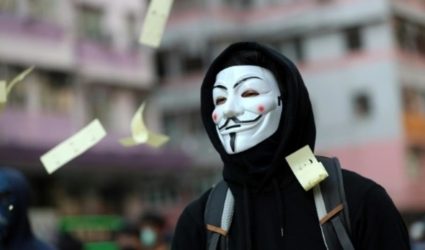Hong Kong government invokes emergency powers, bans face masks

(CNA) – Thousands of masked protesters marched through Hong Kong on Friday (Oct 4) as the government readied to use emergency powers to ban face coverings amid increasingly violent protests.
Large crowds of mostly office workers hit the streets during the workday lunch break over the pro-Beijing regime’s expected use of colonial-era laws that opponents said would tip the city towards authoritarianism.
At a press conference in the late afternoon, Hong Kong leader Carrie Lam announced the government was invoking emergency laws that would allow authorities to “make any regulations whatsoever” in the public interest.
This could include curfews, censorship of the media, control of harbours, ports and transportation.
The government also banned the use of face masks that many protesters have been wearing to hide their identity.
The last time the government used emergency laws was in 1967 to suppress leftist riots during China’s Cultural Revolution.
ARVE Error: src mismatch
provider: youtube
url: https://www.youtube.com/watch?v=QLcEasVzCf0
src in org: https://www.youtube.com/embed/QLcEasVzCf0?wmode=transparent&rel=0&feature=oembed
src in mod: https://www.youtube.com/embed/QLcEasVzCf0?wmode=transparent&rel=0
src gen org: https://www.youtube.com/embed/QLcEasVzCf0
PROTESTERS VOW TO DEFY BAN ON FACE MASKS
Some potesters have vowed to defy the law.
“Youngsters are risking their lives, they don’t mind being jailed for 10 years, so wearing masks is not a problem,” a 34-year-old officer worker wearing a surgical mask, who gave her first name Mary, told AFP at a protest on Friday afternoon.
The ban comes after Hong Kong was rocked by the worst violence this summer on Tuesday, the same day China celebrated 70 years of Communist Party rule.
Street battles raged for hours between riot police and hardcore protesters while a teenager who was part of a group that attacked police with umbrellas and poles was shot in the chest with a live round – the first such shooting since the protests began.
Police said the officer involved in the shooting acted in self-defence because his life was under threat. The teenager is in hospital in a stable condition.
Growing opposition to the Hong Kong government has plunged the financial hub into its biggest political crisis in decades and poses the gravest popular challenge to Chinese President Xi Jinping since he came to power in 2012.
Riot police moved in to districts across Hong Kong overnight, firing tear gas at a chanting crowd in a residential area, while rail operator MTR Corp shut several stations as violence escalated.
On Friday, MTR said 83 of its 91 underground stations had been vandalised in recent months after protesters turned on the operator.
All stations were operating normally on Friday morning.
EMERGENCY LAW COULD ANTAGONISE PROTESTERS FURTHER
Any implementation of emergency law could further antagonise demonstrators already angry at what they perceive as creeping interference by Beijing in their city’s affairs despite a promise of autonomy in the “one country, two systems” formula under which Hong Kong returned to China in 1997.
China dismisses accusations it is meddling and has accused foreign governments, including the United States and Britain, of stirring up anti-China sentiment.
Police, who have responded to petrol bomb-throwing protesters with tear gas, water cannon and, on Tuesday, live ammunition, had urged the government to impose curfews to help maintain public order.
Authorities have already loosened guidelines on the use of force by police, according to documents seen by Reuters.
In the documents seen, the police manual changed some guidelines on how officers could act when considering force.
The updated guidelines also removed a line that said “officers will be accountable for their own actions”, stating only that “officers on the ground should exercise their own discretion to determine what level of force is justified in a given situation”.
Black-clad protesters, who typically wear masks to shield their appearance, have targeted police, who in turn have been accused of excessive force and heavy-handed tactics. Police say they have shown restraint in the face of increased violence.
Pro-Beijing groups have also been pushing for legislation to ban face masks at public demonstrations.
The protests began over a now-withdrawn extradition Bill, which would have allowed people to be sent to mainland China for trial, and have intensified markedly since June. They have also evolved into wider calls for democracy, among other demands.
Hong Kong’s richest man Li Ka-shing donates HK$1 billion to support local businesses

